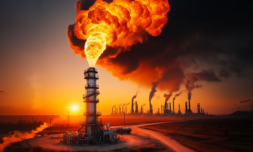A report from the Carbon Majors Database reveals that a mere 57 companies have been responsible for 80% of global GHG emissions since 2016.
Disclaimer: This update is not intended to create a sense of nihilism or apathy regarding attitudes towards civil action and the mitigation of climate change.
We prefer to pontificate that transparency is the key to ultimately holding offenders responsible. So, with that in mind, let’s bear witness to the latest revelations.
The Carbon Majors Database has published a new report stating that just 57 companies are linked to as much as 80% of GHG emissions generated since 2016. Why 2016, you ask? Because that was the year that the Paris Agreement was formally established.
It’s no secret that oil barons, both state and corporate-owned, are the key driver of anthropogenic climate change, but the data shows that this cohort of mega-emitters significantly scaled up their output immediately after the green reform was drawn up.
In the seven years since, ExxonMobil has been public enemy number one – linked to 3.6 gigatons of CO2, equivalent to 1.4% of all emissions globally. Close behind were Shell, BP, Chevron, and TotalEnergies who were each responsible for another 1% respectively.
REMINDER: Just 57 companies are linked to 80% of global emissions since 2016. pic.twitter.com/2x9rD7UcOH
— Greenpeace UK (@GreenpeaceUK) April 4, 2024
The report’s most notable trend is the drastic upturn in emissions from state-owned producers since 2016, particularly in the Asian coal sector. You can zero in on the specifics of nations and industries on Influence Map, which was established in 2013.
If you’re after one major summation to take from this, however, it’s that the fossil fuel industry never had any intention of honouring the terms of the Paris Agreement. Make no mistake, our present lack of progress is largely attributable to the entities listed.




















